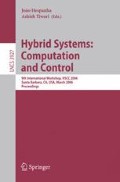Abstract
The problem of driving a collection of mobile robots to a given target location is studied in the context of partial difference equations. In particular, we are interested in achieving this transfer while ensuring that the agents stay in the convex polytope spanned by dedicated leader-agents, whose dynamics will be given by a hybrid Stop-Go policy. The resulting system ensures containment through the enabling result that under a Laplacian, decentralized control strategy for the followers, these followers will converge to a location in the convex leader polytope, as long as the leaders are stationary and the interaction graph is connected. Simulation results testify to the viability of the proposed, hybrid control strategy.
Access this chapter
Tax calculation will be finalised at checkout
Purchases are for personal use only
Preview
Unable to display preview. Download preview PDF.
References
Parker, L.E., Kannan, B., Fu, X., Tang, Y.: Heterogeneous mobile sensor net deployment using robot herding and line-of-sight formations. In: Proceedings of IEEE International Conference on Intelligent Robots and Systems, pp. 681–689 (2003)
Vaughan, R., Sumpter, N., Henderson, J., Frost, A., Cameron, S.: Experiments in automatic flock control. Journal of Robotics and Autonomous Systems 31, 109–117 (2000)
Desai, J., Ostrowski, J.P., Kumar, V.: Controlling formations of multiple mobile robots. In: Proc. IEEE Int. Conf. Robot. Automat., pp. 2864–2869 (1998)
Ji, M., Muhammad, A., Egerstedt, M.: Leader-based multi-agent coordination: Controllability and optimal control. In: the American Control Conference, Minneapolis (submitted) (June 2006)
Tanner, H., Pappas, G., Kumar, V.: Leader to formation stability. IEEE Transactions on Robotics and Automation 20(3), 443–455 (2004)
Tanner, H., Jadbabaie, A., Pappas, G.: Flocking in fixed and switching networks (submitted 2005), http://www.seas.upenn.edu/~pappasg/publications.html#journals
Saber, R.O.: A unified analytical look at Reynolds flocking rules. Technical Report CIT-CDS 03-014, California Institute of Technology (2003)
Muhammad, A., Egerstedt, M.: Connectivity graphs as models of local interactions. Journal of Applied Mathematics and Computation (to appear, 2005)
Egerstedt, M., Martin, C.: Conflict resolution for autonomous vehicles: A case study in hierarchical control design. International Journal of Hybrid Systems 2(3), 221–234 (2002)
Sussmann, H.: A maximum principle for hybrid optimal control problems. In: 38th IEEE Conference on Decision and Control (1999)
Ferrari-Trecate, G., Buffa, A., Gati, M.: Analysis of coordination in multiple agents formations through Partial difference Equations. Technical Report 5-PV, IMATI-CNR (2004), http://www-rocq.inria.fr/who/Giancarlo.Ferrari-Trecate/publications.html
Bollobás, B.: Modern graph theory. Graduate texts in Mathematics. Springer, Heidelberg (1998)
Bensoussan, A., Menaldi, J.L.: Difference equations on weighted graphs. Journal of Convex Analysis (Special issue in honor of Claude Lemaréchal) 12(1), 13–44 (2005)
Ferrari-Trecate, G., Buffa, A., Gati, M.: Analysis of coordination in multi-agent systems through partial difference equations. Part I: The Laplacian control. In: 16th IFAC World Congress on Automatic Control (2005)
Jadbabaie, A., Lin, J., Morse, A.S.: Coordination of groups of mobile autonomous agents using nearest neighbor rules. IEEE Trans. on Automatic Control 48(6), 988–1001 (2003)
Olfati-Saber, R., Murray, R.: Consensus problems in networks of agents with switching topology and time-delays. IEEE Trans on Autom. Control 49(9), 101–115 (2004)
Dautray, R., Lions, J.-L.: Mathematical analysis and numerical methods for science and technology. Evolution problems I-II, vol. 5-6. Springer-Verlag, Berlin (1992)
Johansson, K., Egerstedt, M., Lygeros, J., Sastry., S.: Regularization of zeno hybrid automata. Systems and Control Letters 38, 141–150 (1999)
Author information
Authors and Affiliations
Editor information
Editors and Affiliations
Rights and permissions
Copyright information
© 2006 Springer-Verlag Berlin Heidelberg
About this paper
Cite this paper
Ferrari-Trecate, G., Egerstedt, M., Buffa, A., Ji, M. (2006). Laplacian Sheep: A Hybrid, Stop-Go Policy for Leader-Based Containment Control. In: Hespanha, J.P., Tiwari, A. (eds) Hybrid Systems: Computation and Control. HSCC 2006. Lecture Notes in Computer Science, vol 3927. Springer, Berlin, Heidelberg. https://doi.org/10.1007/11730637_18
Download citation
DOI: https://doi.org/10.1007/11730637_18
Publisher Name: Springer, Berlin, Heidelberg
Print ISBN: 978-3-540-33170-4
Online ISBN: 978-3-540-33171-1
eBook Packages: Computer ScienceComputer Science (R0)

